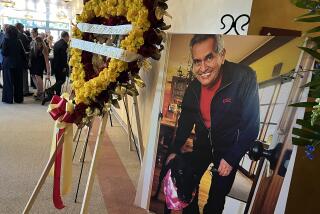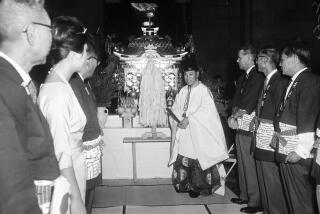Bradley’s Life Saluted in Outpouring of Tributes
- Share via
Former Mayor Tom Bradley was eulogized Monday as a heroic and historic leader who helped build modern Los Angeles, opened the city’s political doors to all people and never forgot his roots as a poor boy from rural Texas.
Dignitaries including Vice President Al Gore, Gov. Pete Wilson and Mayor Richard Riordan filled a three-hour funeral service with tributes to Bradley’s achievements--for his city, for African Americans and for the dispossessed.
For the record:
12:00 a.m. Oct. 7, 1998 For the Record
Los Angeles Times Wednesday October 7, 1998 Home Edition Part A Page 3 Metro Desk 2 inches; 42 words Type of Material: Correction
Bradley funeral--In Tuesday’s coverage of the funeral of former Los Angeles Mayor Tom Bradley, a photo caption misidentified one of Bradley’s former aides. The man pictured embracing another mourner was Maury Weiner, former first chief deputy mayor, not former City Councilman Marvin Braude.
For the Record
Los Angeles Times Tuesday January 12, 1999 Home Edition Metro Part B Page 3 Metro Desk 3 inches; 74 words Type of Material: Correction
Tom Bradley--In several stories on the death of former Mayor Tom Bradley, The Times said Bradley had been the first African American to reach the rank of lieutenant in the Los Angeles Police Department. That distinction was achieved by at least three others before him. In 1923, William L. Stevens became the department’s first black lieutenant detective, and two others, Roscoe Washington and A.J. Johnson, became lieutenants in 1945. When Bradley retired from the LAPD to practice law, he was its only active black lieutenant.
The service before an overflow audience of 1,500 at the First African Methodist Episcopal Church reached its emotional climax as Bradley’s oldest allies literally sang his praises, recalling him as a man of the people who “always did right by us.”
The church’s pastor, the Rev. Cecil L. “Chip” Murray, urged the gathering to live in the spirit of peace and understanding, which he said Bradley brought to the city he governed for 20 years.
“When we lift up on the shield this fallen warrior, Tom Bradley, we are lifting up more than a companion,” Murray said. “We are lifting up a concept, the concept of servant-hood.”
Bradley’s friends and former political foes joined in the praise of Los Angeles’ first black mayor and its longest-serving chief executive. Bradley, 80, died last week of heart failure.
In the audience were former Secretary of State Warren Christopher, U.S. Sen. Barbara Boxer, the Rev. Jesse Jackson, San Francisco Mayor Willie Brown and former Gov. George Deukmejian, the Republican who twice defeated Democrat Bradley’s runs for governor, once narrowly and once by a wide margin.
With musical tributes by the Rev. O.C. Smith, Edna Williams, the 90-member First AME choir and a surprise appearance by entertainer Stevie Wonder, what began as a sort of official state event warmed into more of a revival meeting.
Political allies and enemies shook hands and slapped backs just a few feet from where Bradley rested in an open, black coffin. Even Gore, famous for his wooden persona, swayed to the music.
When the vice president rose first in a series of speakers from the halls of government, he recalled that Bradley and Jackie Robinson were fellow athletes at UCLA. Gore dubbed Bradley “the Jackie Robinson of public service.”
Paraphrasing Martin Luther King Jr., the vice president said the “arc of the universe” tends toward justice.
“And so it was for Tom Bradley,” Gore said, “whose whole life was a testament to faith and hope. . . . That arc led all the way from a tiny log cabin in Texas to the towering skyline in this place that he helped make one of the great cities in the world.
“Today, in the City of Angels there is one more angel watching over us,” Gore concluded, words that were greeted by a standing ovation.
The Republican Wilson also recalled Bradley warmly as a gentle and gracious man.
“His election and years in the mayor’s office had enormous significance both real and symbolic,” Wilson said. “The real you can see all around us from the tallest buildings of Bunker Hill to the speeding trains beneath our streets. . . . And the symbolic significance of his mayoralty exceeds even those changes.”
Recollections From Friends, Colleagues
To Watts community activist “Sweet” Alice Harris, that significance was personal and as close as the nearest telephone. Even with a bevy of aides surrounding him, even 20 years after he took office, Harris said “the mayor” always would return a phone call.
She remembered how she once called the mayor, asking him to come to Los Angeles International Airport to send off a group of young men who were taking a trip to Hawaii. Many of the teenagers had never been in an airplane, but would not admit they were afraid.
“The mayor took them off to a quiet place and talked to them and later I asked one of them what he said,” Harris recalled. “The mayor told them it was all right for a man to be scared. It was all right for a man to cry. He put that safeguard in for them. He told them they were somebody.”
The audience roared with laughter a moment later, when Harris imagined a conversation in heaven between Bradley and Kenneth Hahn, the venerable county supervisor who also represented the African American community for decades. “The mayor’s saying, ‘Kenny, there ain’t no potholes in the street here. And if there are, don’t worry, they are taking care of them.’ ”
Harris concluded: “The mayor was all right with poor folk. I don’t know about the rich. I don’t know about that. But he didn’t forget. He was all right by us.”
The services were arranged with the direction of Bradley’s widow, Ethel, and his daughters, Phyllis and Lorraine. The daughters leaned over to kiss their father, whose casket lay before the altar for several hours before the service.
They then took their seats beside Ethel Bradley, who wore a feathered hat and a jade medallion. She smiled, in particular, when speakers mentioned her love of the Los Angeles Dodgers. The mayor’s longtime secretary during his years in office and the five years since, Connie Chappell, thanked the public for an outpouring of letters, flowers and other tributes. She said the Bradleys had not planned to speak publicly.
The guest list for the service was, in itself, a tribute to the breadth and reach of Bradley’s career. Buddhist monks joined a rabbi who worked with Bradley for many years, as did an emissary from Cardinal Roger Mahony, who was in Rome and unable to attend. Sports figures Peter O’Malley, Jamal Wilkes, Rosie Grier and Walt Hazzard were there. So were members of a hot rod and motorcycle racing club that Bradley supported--wearing denim jackets decorated with colorful patches. Current and former City Council members filled more than two rows.
In yet another measure of Bradley’s wide appeal, all three network television affiliates and four local television stations preempted regular programs to carry all or most of the service live.
In the argot of another generation, many speakers made it clear that the personal was political during the Bradley era.
After hearing of Bradley’s death, Gwendolyn Jones dug up her treasured campaign buttons from Bradley’s unsuccessful 1986 gubernatorial race and his victorious 1989 reelection as mayor. At the funeral Monday, she pinned them on the left side of her dress as a reminder of her days as a campaign volunteer.
“He really was a cordial man. He treated everybody alike and that’s what I liked about him,” Jones, a retired secretary, said from her seat in the church balcony.
“Big Willie” Andrew Robinson, president of the Brotherhood of Street Racers, recalled how Bradley had helped that racing group work on youth activity programs. “He was not a black mayor. He was not a white mayor. He was not a yellow mayor. He was not a brown mayor. He was the people’s mayor,” said Robinson, who wore Army fatigues to the funeral.
To Police Chief Bernard C. Parks, Bradley was one of the Police Department’s “pathfinders and the pioneers of yesteryear,” who opened the LAPD to all races and became the department’s first black lieutenant. “There would not be a Chief Bernard Parks today if there had not been a Tom Bradley,” Parks told the audience.
To Los Angeles County Supervisor Yvonne Brathwaite Burke, who began her law career alongside Bradley, the councilman and mayor was an icon for striving young black people.
To Lt. Gov. Gray Davis, Bradley was a first mentor. Davis, then a young lawyer, helped with Bradley’s first successful run for mayor in 1973.
“He taught me to always look for the better angels of our nature,” Davis said. “He taught me no matter how long the odds and no matter how many obstacles, never, never give up on your dream.”
Bradley’s legacy appeared in more than words when Mayor Riordan asked current and former City Hall employees who worked under his predecessor to stand. Slowly, dozens of them rose--white, Latino, Asian and African-American.
Riordan remarked: “That is beautiful.”
Bishop H.H. Brookins of the African Methodist Episcopal church said the magnitude of that breakthrough in the city’s work force should not be forgotten by later generations.
“City Hall was closed to black people before,” said Brookins, one of Bradley’s early political advisors. “Those doors now stand ajar and they will never be closed in our faces again.”
Performance by Stevie Wonder
Outside the church, founded 126 years ago and now one of Los Angeles’ most prestigious African American congregations, about 200 people listened to the services on loud speakers.
Some shouted “Amen!” with the Rev. Murray. One man played solemnly on his flute and a couple of others sold T-shirts with Bradley’s likeness, to raise money for a youth group.
The unanticipated appearance of Wonder, the famed singer and songwriter, thrilled many inside and outside the church.
Wonder said that because he is blind, he could not see Bradley’s face. “But I had the pleasure of seeing his heart and that it was one of the most beautiful hearts I have ever known,” said Wonder, who then electrified the audience with his soulful version of “Thank You Lord.”
Many people raised their arms in affirmation and clapped their hands, calling out in joy and prayer.
The service was followed by a brief ceremony at Inglewood Memorial Park. Ethel Bradley and her two daughters were joined by about 75 family and former staff members beneath a brilliantly blooming Japanese silk tree.
An LAPD honor guard marched in formation and fired three volleys. The Police Department’s helicopter squadron flew overhead, with one craft breaking away to symbolize the loss of a brother officer.
After Parks presented Ethel Bradley with a folded American flag, her husband’s body was placed in a mausoleum that also holds Ella Fitzgerald.
Murray offered the final farewell: “Good night, Tom. We’ll see you in the morning.”
Times staff writers Hugo Martin and Carla Rivera contributed to this story.
Video clips from the Bradley funeral can be viewed on The Times’ Web site:
https://www.latimes.com/bradley
More to Read
Get the L.A. Times Politics newsletter
Deeply reported insights into legislation, politics and policy from Sacramento, Washington and beyond. In your inbox twice per week.
You may occasionally receive promotional content from the Los Angeles Times.












